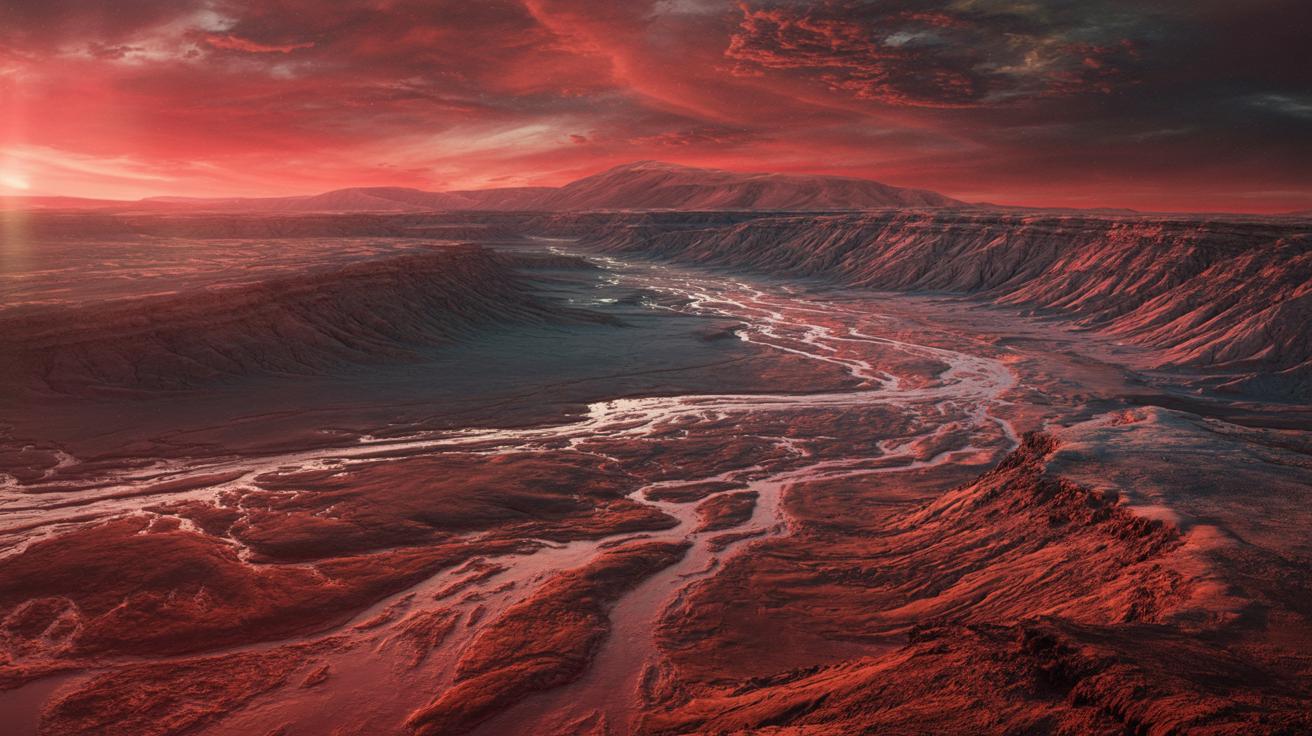What You Need to Know
- 🌌 Scientists have discovered nearly 10,000 miles of ancient riverbeds on Mars, indicating a once water-rich environment.
- 🔍 High-resolution images from Mars orbiters reveal extensive networks of fluvial sinuous ridges across the southern highlands.
- 🏞️ The findings challenge previous assumptions about Mars’s aridity, especially in the Noachis Terra region.
- 🌧️ Evidence suggests that Mars’s ancient climate supported regular rainfall or snowfall, painting a picture of a dynamic planet.
- 🚀 These discoveries fuel ongoing research and exploration, raising questions about Mars’s potential to have supported life.
The discovery of ancient riverbeds on Mars has sparked excitement and intrigue among scientists and space enthusiasts alike. These findings suggest that Mars, often perceived as a barren and arid planet, once harbored extensive bodies of water. This revelation not only challenges previous assumptions about the Martian climate but also opens up new avenues for exploring the potential for life on the Red Planet. The geological traces of vast watercourses provide a glimpse into a past where Mars was a wetter, more dynamic world. As researchers delve deeper into this discovery, the implications for our understanding of Mars and the broader universe continue to expand.
Unveiling Mars’s Ancient Waterways
Recent analyses of high-resolution images captured by Mars orbiters have revealed the existence of nearly 10,000 miles of ancient riverbeds across the southern highlands of Mars. These networks of watercourses are believed to be more than 3 billion years old, indicating that Mars once experienced a climate capable of supporting regular precipitation. The evidence suggests that these riverbeds were replenished by steady rainfall or snowfall, painting a picture of a planet far more alive than previously imagined.
The southern highlands, particularly the region known as Noachis Terra, have shown extensive geological features known as fluvial sinuous ridges. These ridges form when sediment from ancient rivers hardens over time and is later exposed as the surrounding softer ground erodes. Some of these ridges span more than a mile wide, demonstrating the vast scale of ancient Martian waterways. This discovery challenges the traditional view of Mars and stimulates further inquiry into its climatic history.
The Enigmatic Noachis Terra
Noachis Terra, also referred to as the Land of Noah, stands as one of the most intriguing areas of Mars due to its age and geological complexity. Despite previous assumptions of its aridity, the new findings suggest that this region once experienced substantial rainfall or snowfall. Computer models of the ancient Martian climate align with these findings, proposing that water flow sculpted the terrain, carving out valleys and channels.
Researchers utilized images from NASA’s Mars Reconnaissance Orbiter and Mars Global Surveyor, covering nearly 4 million square miles, to uncover these hidden waterways. The images revealed intricate networks of ridges, some forming meandering tributaries and others showing where riverbanks burst to flood craters. These features point to a dynamic hydrological system, hinting at a time when Mars was teeming with water.
Implications for Martian Climate and Life
The presence of such extensive river systems suggests that Mars once had a climate capable of supporting large bodies of water. This raises questions about the planet’s potential to support life in its distant past. The discovery of these riverbeds implies a more complex and possibly habitable environment, challenging the notion of Mars as a perpetually desolate landscape.
Mars’s transformation from a wet world to its current dry state is attributed to the waning of its magnetic field, which allowed the solar wind to strip away its atmosphere. Yet, some scientists speculate that hidden reservoirs of water might still exist beneath Mars’s surface, beyond its polar ice caps. This possibility fuels ongoing research and exploration, with implications for future missions aimed at uncovering the planet’s secrets.
Future Exploration and Questions
The discovery of ancient riverbeds on Mars propels scientific inquiry into new realms. As researchers continue to analyze the data, they are tasked with piecing together the history of Mars’s climate and evaluating its capacity to support life. These findings not only influence our understanding of Mars but also have broader implications for the study of planetary evolution across the solar system.
With the potential for hidden water reservoirs and a more dynamic climatic history, the question remains: How much of Mars’s watery past has influenced its current state? Future missions and technological advancements may reveal more about this enigmatic planet, and perhaps, one day, answer the age-old question of whether life ever thrived on Mars.
The revelations of Mars’s ancient waterways invite us to reconsider our understanding of the Red Planet. As we continue to explore and uncover more of its secrets, we are left pondering: What other mysteries does Mars hold, waiting to be unearthed by future explorers?
Did you like it?4.5/5 (27)







10 comments
EvanNebulae
With such discoveries, are there plans to explore these areas more closely with rovers?
faithtranquility
It’s amazing to think Mars once had rainfall. I guess umbrellas would have been handy there!
NoraBeacon6
Thanks for the post! How does this challenge our current understanding of planetary climates?
Smokey3
I wonder what the ancient Martian weather forecast would have sounded like. “Rainy with a chance of alien fish?
MiloSpecter
Incredible discovery! Could these riverbeds have supported any known forms of life?
pipercelestia
Can we expect to find fossils of Martian fish next? 😉
ChaseShadowdancer
This is fascinating! How do these findings impact the search for life on Mars?
Xavier_Quasar
So Mars was a waterpark in its past life? That’s wild!
SophiaCelestia7
Thanks for sharing this! Do you think these findings will change how we plan future missions to Mars?
Bryson
Wow, 10,000 miles of riverbeds! Mars was like a cosmic Venice! 🛶